
-
Find the right food for your pet
Take this quiz to see which food may be the best for your furry friend.
Find the right food for your pet
Take this quiz to see which food may be the best for your furry friend.
Featured products
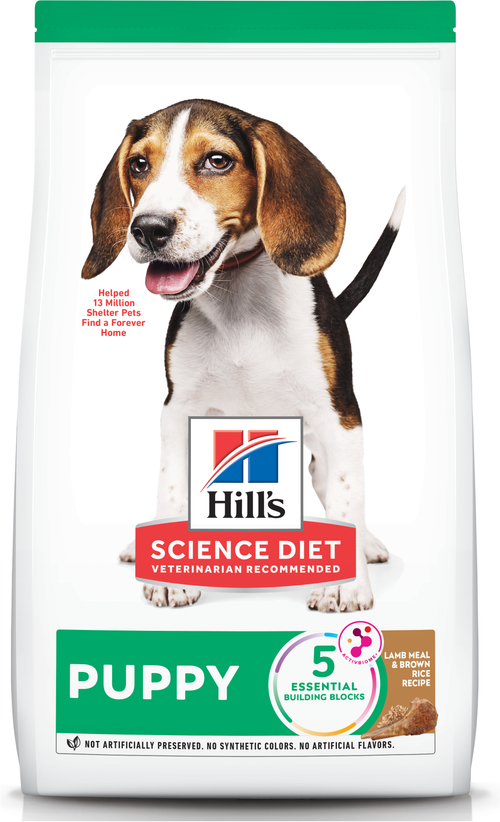 Puppy Lamb Meal & Brown Rice Recipe
Puppy Lamb Meal & Brown Rice RecipeVital nutrients to support 5 essential building blocks for lifelong health
Shop Now Adult Small Bites Chicken & Barley Recipe Dog Food
Adult Small Bites Chicken & Barley Recipe Dog FoodSupports lean muscle for dogs who prefer smaller kibble
Shop Now Adult Small Bites Lamb Meal & Brown Rice Recipe Dog Food
Adult Small Bites Lamb Meal & Brown Rice Recipe Dog FoodSupports lean muscle, for dogs who prefer smaller kibble
Shop NowFeatured products
 Kitten Chicken Recipe
Kitten Chicken RecipeVital nutrients to support 5 essential building blocks for lifelong health
Shop Now Adult Indoor Chicken Recipe Cat Food
Adult Indoor Chicken Recipe Cat FoodSupports energy level and beautiful fur in indoor cats
Shop Now Kitten Healthy Cuisine Tender Chicken & Rice Medley
Kitten Healthy Cuisine Tender Chicken & Rice MedleyDelicious tender chicken and rice in a mouthwatering sauce with precisely balanced nutrition to support 5 essential building blocks for lifelong health
Shop Now -
Dog
- Dog Tips & Articles
-
Health Category
- Weight
- Food & Environmental Sensitivities
- Urinary
- Digestive
- Joint
- Kidney
-
Life Stage
- Puppy Nutrition
- Adult Nutrition
Cat
- Cat Tips & Articles
-
Health Category
- Weight
- Skin & Food Sensitivities
- Urinary
- Digestive
- Kidney
-
Life Stage
- Adult Nutrition
Featured articles
 Pet Food Storage Tips
Pet Food Storage TipsDiscover how and where to store your dry, as well as canned, dog and cat food. Learn how to find the "best before" dates on all Hill's pet food packaging.
Read More The Incredible Science Behind Your Pet's Microbiome
The Incredible Science Behind Your Pet's MicrobiomeLearn what a pet's microbiome is, how it contributes to your pet's gut & overall health, and why nutrition is important in maintaining healthy microbiomes.
Read More Water
WaterDiscover why water is the most important nutrient for your dog or cat to live a healthy life. Find out how much water your pet should consume each day.
Read More -
Find the right food for your pet
Find the right food for your pet


If you notice a lump on your cat's belly after abdominal surgery, you may be worried that it's a hernia. While a cat hernia after being spayed is possible, swelling on your cat's stomach could be a number of other things — but there's usually no reason to worry.
Read on to learn more about the different kinds of hernias, other reasons for abdominal lumps and bumps in cats, and when to seek veterinary care.
What Is a Cat Hernia?
According to the Merck Veterinary Manual, hernias of the abdominal wall are common in all domestic species, and cats are no exception. Hernias are defects, or holes, in the walls within the cat's body that separate one part from the other. An example of one of these "walls" is the abdominal wall that keeps your cat's abdominal organs in place and separate from tissue and fat directly underneath the skin. Hernias are often classified by location, including:
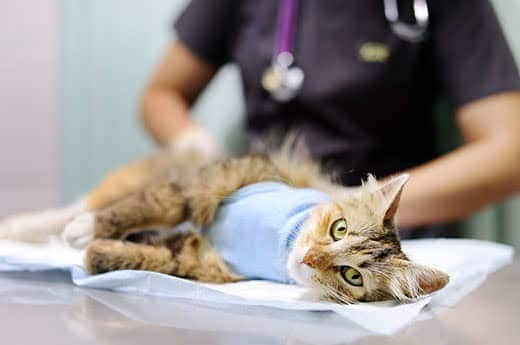
- Umbilical hernias: These range in size from barely detectable to quite large. They may contain fat from the cat's belly cavity, or in more severe cases, intestines. The most commonly seen hernia in cats, these occur when the abdominal wall has a hole in it. They may be discreet, but when the cat stands on all fours, a bubble-like swelling may appear as fat or intestines from the abdomen move into this "pocket."
- Inguinal hernias: Also known as scrotal hernias, these are less common in cats and involve a hole through the abdomen through a small canal in the groin area. Inguinal hernias can occur in both females and males.
- Diaphragmatic hernias: Even more rare, there are several hernias that can occur between the abdomen and chest cavity by the diaphragm. They are often seen in kitties that have been hit by a car, though some cats may be born with them.
Hernias can vary in severity but are often congenital, or present at birth, especially in kittens. According to a journal in VetRecord, there is a genetic and developmental basis for umbilical hernias in cats, as well as dogs. Alternatively, hernias can occur at various points throughout a cat's life. Traumatic hernias may be caused by events such as a difficult birth or a physical trauma. In some cases, a hernia can develop after surgery.
Diagnosing and Treating a Cat Hernia
Hernias are easily diagnosed as your veterinarian will usually be able to feel the defect and gently replace the contents that have shifted into their hernia's "pouch." There are a few cases where an ultrasound or radiographs (X-rays) are necessary if the diagnosis is not clear based upon palpation.
For most minor hernias, it is generally safe to keep an eye on the hernia, making sure it doesn't grow until your vet can repair it surgically. Surgical repair for kittens with hernias will usually be scheduled for the time of the spay or neuter surgery, so the patient only has to undergo anesthesia and recovery a single time. As long as the cat is doing well and behaving normally at home, a hernia is not an emergency.
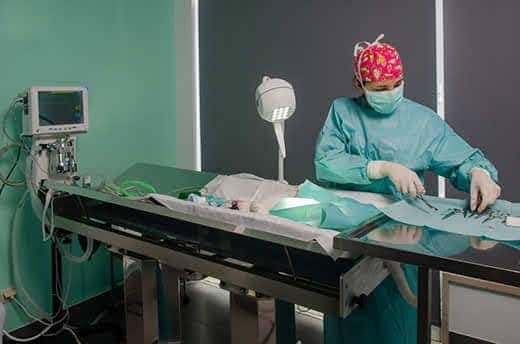
If the hernia is quite sizable or enlarges, it isn't safe to wait. In this case, the hernia must be addressed soon to avoid risking the abdominal cavity contents becoming trapped or twisted, compromising the cat's blood supply. This can lead to a life-threatening situation. A cat may be in critical condition because of a severe hernia, though this is uncommon.


Tasty Tips
When You Notice Lumps After Surgery
Post-surgical swelling is often benign but may need further examination by your vet. Here are some of the most common reasons for swelling after surgery:
- Surgical cutting of tissue creates localized inflammation at the site of the incision. Some minor swelling is expected and is part of the body's healing process. Major swelling is atypical and requires immediate attention as it may indicate that the internal sutures have not held and a traumatic hernia has occurred, that your cat has developed a seroma (a swelling of fluid at the surgical site) or that your cat has an infection.
- Suture material is foreign to the body, and while you may only see one layer of sutures on a cat's body, there are three layers of sutures involved in closing your cat's abdomen. If you see a small bump at either end of the incision line, it may simply be the knot of the sutures underneath the skin, or where the vet closes the incision line with a technique called "burying the sutures." A cat's body will react to the suture, and some cats can react more than others. It is usually not a concern as long as the incision area isn't red, irritated, leaking, painful or very swollen.
- As the body repairs the surgical incision, it lays down more tissue, generally referred to as scar tissue. This thickening is often noticeable by touch after abdominal surgeries. It may resemble a firm, bumpy line or a small rope across the incision.
- Finally, there may be reasons for lumps that are not associated with the surgery at all. Abdominal surgery involves shaving a cat's stomach, so different bumps that were previously hidden by fur may now be revealed.
Remember, if you suspect your furry friend has developed a hernia after being spayed or neutered, contact your vet. They will most likely recommend a recheck to determine if it is a hernia or if there is another explanation for the abdominal swelling. Hernias have a great prognosis and are typically resolved with surgery.


Dr. Laci Schaible is a small animal veterinarian, veterinary journalist, and a thought leader in the industry. She received her Doctor of Veterinary Medicine from Texas A&M University and her Masters in Legal Studies from Wake Forest University.
Related products

Delicious roasted chicken and rice in a mouthwatering sauce

Vital nutrients to support 5 essential building blocks for lifelong health

Delicious tender chicken and rice in a mouthwatering sauce with precisely balanced nutrition to support 5 essential building blocks for lifelong health

Supports energy level and beautiful fur in indoor cats
Related articles

Discover how to identify cat sensitive skin and what you can do to help your cat thrive from head to paw.
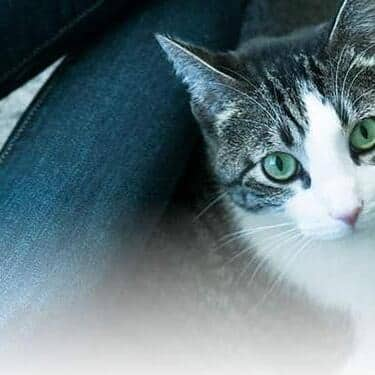
Brushing your cat's teeth is just as important as brushing your own. Learn signs or oral health problems in your cat and how to avoid them.

What is the best food for an overweight cat? Learn all about weight control food for cats, including what's in it and how it works.
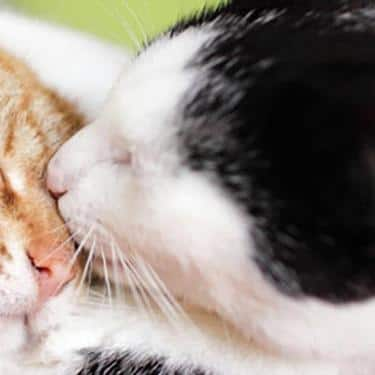
Learn the different factors that might be contributing to your cat's weight gain, and how bigger doesn't always mean better.

Put your cat on a diet without them knowing
Our low calorie formula helps you control your cat's weight. It's packed with high-quality protein for building lean muscles, and made with purposeful ingredients for a flavorful, nutritious meal. Clinically proven antioxidants, Vitamin C+E, help promote a healthy immune system.
Put your cat on a diet without them knowing
Our low calorie formula helps you control your cat's weight. It's packed with high-quality protein for building lean muscles, and made with purposeful ingredients for a flavorful, nutritious meal. Clinically proven antioxidants, Vitamin C+E, help promote a healthy immune system.

